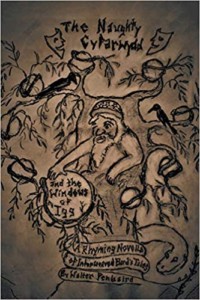Title: The Naughty Cyfarwydd and the Windows of Igg: A Rhyming Novella of Interweaved Bard’s Tale
Author: Walter Penbaird
Publisher: iUniverse
ASIN: B07P18P238
Pages: 278
Genre: Novella in Verse
Reviewed by: Thomas Macolino
Pacific Book Review
The Naughty Cyfarwydd and the Windows of Igg by Walter Penbaird is an enigma. Fully encapsulating the experience of reading it is something a short, written review such as this is challenging to accomplish, to say the least. It is a verse novel, written nearly entirely in rhyming couplets. It is a frame narrative, with the narrator and protagonist, Cyfarwydd, a welsh bard, providing the outer structure.
After a shedding some blood in a dispute over a woman, Cyfarwydd is forced to flee to Saxony, where he meets with a Saxon bard in the wilderness. This bard regals him with many a tale from Norse mythology, and these make up the majority of the novella. The last few chapters return to Cyfarwydd and his own stories; these are in the thematic style of folktales and Arthurian legend.
After reading the opening pages of The Naughty Cyfarwydd and the Windows of Igg, my first thought was, “Now I finally have an excuse to use ribald in a sentence.” Because this book is textbook ribald. It is bawdy, flippant, and yes, naughty. Over the centuries, poetry as a whole has swung into an art form, like painting or sculpture. It has been used as a way to help visualize the subtleties of natural beauty and understand the intricacies of the human psyche. This book takes poetry back to its roots, where the written word was as rare as salt and gold, and the oral traditions of the common folk ranged from high epics to the filthiest tales.
Penbaird’s novella reads like a first draft of Chaucer. But hold a moment, before you scoff and ask why you would waste valuable time on a first draft. A comparison to Chaucer, one of the oldest and most respected writers in English literature, is a likening to a comparison to Milton or Shakespeare. And even a first draft of Shakespeare would be miles ahead of the plays written today. Penbaird’s frame narrative, rhyming couplets, ribald style, and general setting are all reminiscent of the Father of English Literature’s work. While I would not go as far as to say that they are equal in quality, Penbaird’s novella is an interesting work for readers with an interest in Chaucer to examine. The modern language used creates an easier threshold of access than the translated Old English of Chaucer and others of his era.
Penbaird’s novella does an admirable job encapsulating a style of storytelling that has all but faded from our world: the common bard’s tale. While I regretfully did not have the opportunity to test this hypothesis myself, I suspect the best way to experience this novella is in the setting stories like this used to be told: sung aloud in the evening to friends while laughter and beer both flow freely. A sight, I believe, that would make both Penbaird and his naughty bard Cyfarwydd proud.


